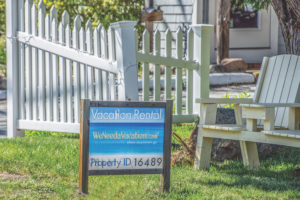Gov. Charlie Baker’s extension of the ban on short-term rentals until at least June 8 takes a bite out of one of the biggest pieces of the Outer Cape’s economic pie, affecting home owners, visitors, and business owners and their employees.

The governor’s announcement on May 18 held out a possible reopening of all types of lodgings, including hotels and home rentals, in the second phase of his four-phase outline. Safety restrictions would kick in at that point, but were undecided as of Tuesday.
There is some hope, however, of “salvaging the summer,” as rental agent Joan Talmadge of Brewster put it, because of an uptick in rentals of more than 31 days.
Baker’s phase 1 began May 18. Each phase will last at least three weeks, and could be extended depending on the data on new cases of Covid-19. The governor’s order also extended the recommended 14-day quarantine for out-of-state visitors.
The early reaction from real estate agents and home owners was resignation, with some hope.
Most short-term renters with reservations in June and much of July had already canceled them before Baker’s announcement, mostly out of concern for their own health, said Robert O’Malley, owner of Beachfront Realty in Provincetown. Gone are most renters for the biggest weeks of the year, the Fourth of July and mid-July’s Bear Week, though many are still holding onto reservations in August, he said.
“I had to refund a lot of deposits,” O’Malley said. “You finally just accept it, and say how am I going come up with this money?”
Baker imposed the short-term rental ban on March 31, restricting such lodging to all but health care and other essential workers and to “members of vulnerable populations” such as the homeless. “Short-term” was defined as 31 days or fewer.
Not every landlord complied, and at least one local health agent has acted to prevent violations of the rule.
Truro Health Agent Emily Beebe said she has issued two cease-and-desist orders to the owners of houses where neighbors observed rotating out-of-state license plates in the driveways and called Beebe to report them.
Beebe said she will continue to enforce the ban.
Driving the Economy
One week is by far the most common length of vacation rentals on the Cape, said Wendy Northcross, executive director of the Cape Cod Chamber of Commerce.
Renting out one’s home to vacationers exploded with the rise of the internet, said Talmadge, co-owner of the short-term rental service We Need a Vacation.
Short-term rentals now far surpass hotels and guest houses as generators of income on the Outer Cape.
According to the website AirDNA.co, which aggregates online rental data from Airbnb, HomeAway, and VRBO, the four Outer Cape towns generated more than $92 million from those three rental platforms alone. Hotels, motels, and guest houses on the Outer Cape took in a total of $49.6 million in revenue in 2018, the last year for which figures were available.
Even in Provincetown, with its many hotels and guest houses, their total take in 2018 was $36.9 million, compared with $40 million in 2019 earnings from 1,148 Airbnb, VRBO, and HomeAway short-term rental properties alone.
Truro had 519 short-term accommodations on those sites in 2019, generating $16 million in rental income, according to AirDNA. Wellfleet had 739 properties advertised, generating $20 million, and Eastham had 666 such properties, earning $16.6 million.
Short-term rental taxes, which were instituted last year, have been lucrative for local town governments, with Provincetown collecting $512,563, Truro $121,376, Wellfleet $167,269, and Eastham $191,738 last year, according to the state Dept. of Revenue.
Brian Allen, of Allen Realty Associates in Eastham, said almost everyone who buys a home on the Outer Cape is looking for a second home, not a primary residence. And every home shopper asks if it’s possible to rent out the property; they always ask about rental history.
As for salvaging the summer, Talmadge said there has been a 128-percent increase in the number of inquiries for longer-term rentals compared to this time last year. Schools are closed, and a lot of people are working from home. That home can be on Cape Cod.
“That’s great news,” Talmadge said. “I’m talking to more and more owners who are saying they’ll have one family for a month. It doesn’t take many of those to get through the summer.”
Staff reporter Paul Benson contributed to this article.



